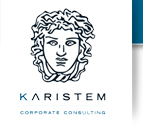
News
Press release
Three questions to…
Thomas Moreau, director of the Karistem Supply Chain Division
“Transit toll for trucks: the constraint must drive innovation”

Boulogne-Billancourt, 30 June 2014. What do you think of the proposed transit toll for trucks which replaces the environmental tax?
Beyond semantics, with the disappearance of the term “tax” in favor of that of “toll”, the drastic reduction of the relevant network (from 15,000 km to 4,000 km) and the exemption of certain categories (agricultural vehicles, milk transport, fairground or circus vehicles) has significantly decreased the scope of the policy. Tax revenues for example should yield half (€ 550 million vs. € 1.2 billion). The introduction of tolls for transit may therefore seem unsatisfactory in some respects but, at least, its part of the virtuous approach of the “Grenelle de l’Environnement” and lays the foundations for a user-pays system. As a reminder, the environmental tax of 2007 and the Grenelle mission were to fight against greenhouse gas emissions. It was a consensus. Thus, according to the Association of Transport Authorities (GART), the environmental tax would help fund more than 120 local urban logistics projects, the development of a metro line or river shuttle for example. At the end of 2013, in a context of fiscal burn out, the project was abandoned. In our opinion, the principle remains interesting and it is consistent that the traffic on the non-franchised national network and some departmental be subject to taxation.
What are the consequences for carriers? Does this project undermined their business model?
The direct consequence for carriers is increased production costs and therefore without changing balances in place, a reduction in their profit margin and as everyone knows, the transport is a sector whose margin levels are very low. As for the environmental tax, there is a possible postponement of the cost of the device on the shippers. The principle seems right but its implementation remains complex. What is the basis of this report? What are the means for shippers to control it? How can the same carrier manage calculating the toll with clients who have very different types of pricing: the cost per kilometer, the package, per ton transported on a fixed variable mix, etc. Beyond the report, what about client factures to refacture the toll linked to km, equipment costs of GPS boxes, software for calculating itineraries, administrative costs, etc. Thus, the entry into force of the transit toll on 1 January 2015 leaves just six months to re-launch the definition of solutions to develop, test and deploy. The deadline is ambitious but tenable, provided allocate resources are dedicated to this project.
What are the consequences for contractors and their transportation purchasing? How to limit any increase in costs due to toll transit?
In simplifying the scheme, the contractors will have three options. First, put more carriers under economic pressure, through a tender for example, to maintain the same total cost of transport. Knowing that the end period of the year is a perfect time for this type of discussion. Secondly, refer this additional cost to their end customers and industrial consumers. Third, look for areas of improvement to offset the rising costs by improving transport productivity. The first two axes are of course possible, but again, the margin levels of carriers and the economic situation in France do not lean in their favor. However, the exploration of the third option is more interesting and we believe source of larger and more lasting gains. Indeed, many levers exist, such as the reduction of kilometers traveled, finding optimal routes or the pooling of transport. Activating these levers can significantly reduce the transportation bill, without changing the margins of carriers. In conclusion, it is ultimately very classic, constraints spur innovation. Thus, the implementation of the new toll will force carriers to change their system and shippers to be more inventive in their modes of operation with the carriers. It should be born of greater efficiency in transport operations, provided that shippers and carriers are able to collaborate. This new toll can be seen as a new opportunity to foster collaboration between these two players and not the balance of power. And thus minimize the effects for everyone.
–
Thomas Moreau has over 15 years of experience in logistics consulting. Graduate from the École Spéciale de Mécanique et d’Electricité and IAE Paris Sorbonne, he began his career in the industry, at P & G then in consulting at Masai before co-founding the firm Austral a few years later, which became Factea Supply Chain in 2011. Specialist in supply chain optimization for companies in all sectors, Thomas Moreau is now one of the Directors of the Supply Chain Division of Karistem Corporate Consulting.
–
Karistem Corporate Consulting briefly. Karistem Corporate Consulting (KCC) is a consulting firm specializing in strategy, transformation and operational excellence. Since 2004, KCC develops and implements major transformation projects supported by the Exectutive Managament to improve the competitiveness of the heart of business and / or support functions to align the business strategy. KCC’s approach is results-oriented and puts people at the heart of each transformation. KCC is committed (1) the involvement and ownership of the change by the largest number of people and (2) on fast, major and lasting results.
They trust KCC: ALSTOM, AREVA, ASML, BOUYGUES, DCNS, ERAMET, GDF-SUEZ, HEURTEY PETROCHEMICALS, MUSHRIF, PEARSON, SAFRAN, SAINT-GOBAIN, TECHNIP, THALES, TOTAL…
Press Contact
Sebastien de Boisfleury
Head of Communications & Marketing
Tel. : 01 44 50 39 12
Mail : sebastien.de-boisfleury@karistem.com




